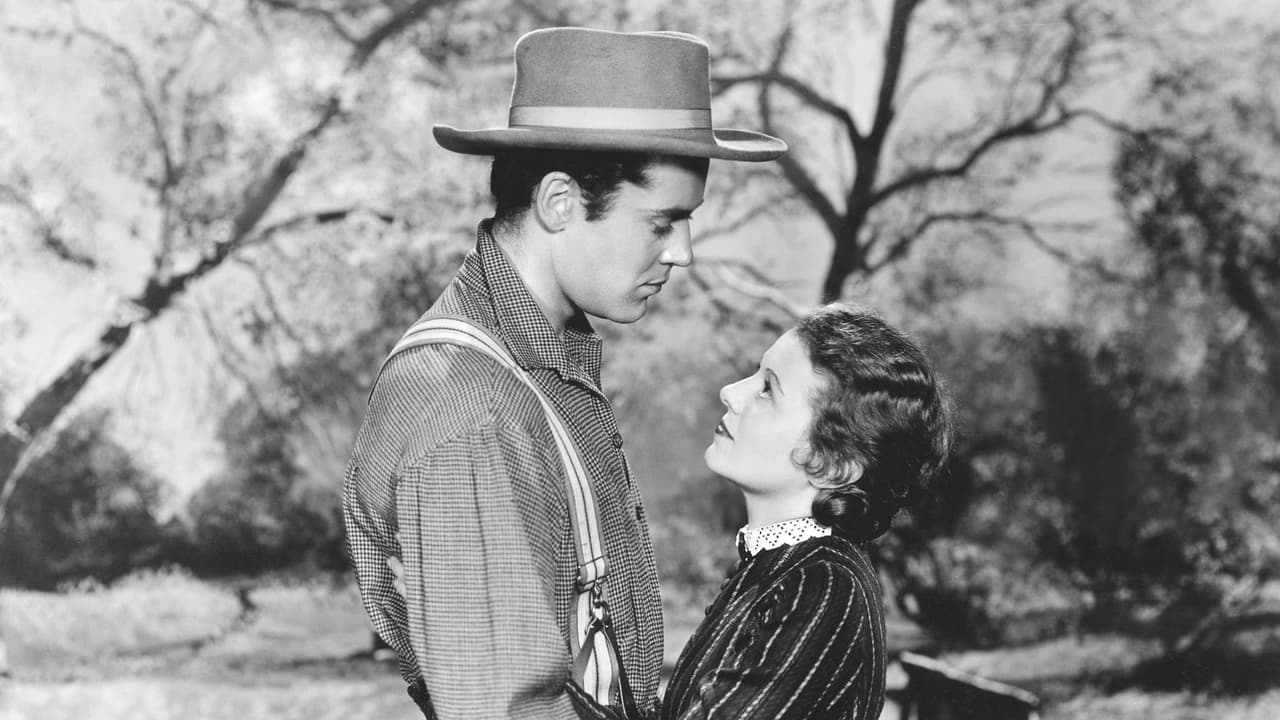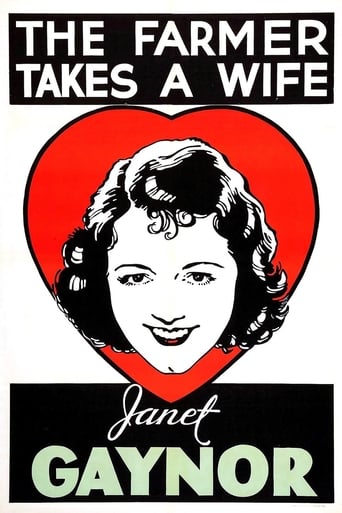

THE FARMER TAKES A WIFE (Fox, 1935), directed by Victor Fleming, stars Janet Gaynor in one of her finer film roles of her latter-day career at her home studio. Often teamed opposite Charles Farrell in as many as twelve feature films that began in 1927, the role of the farmer didn't go to Farrell this time, now that Farrell's career has already past its prime, but to a newcomer to the motion picture screen by the name of Henry Fonda (1905-1982). An appropriate choice considering it was Fonda who starred in the original stage production in 1934, a role that earned him recognition, enough to be selected the lead for his movie debut. As much as Fonda didn't receive any special screen introduction in the opening credits, a common practice that would occur in later years, at least he did have his name placed below his leading lady and above the title, which is an honor in itself.The setting takes place in New York State around the year 1850, where the Erie Canal is the most important means of transportation route through the area. Yet there is new means of progress that's to change all this, and that's the railroad rumored to become its rival force. Molly Larkin (Janet Gaynor), an Irish-spirited girl who comes from a long line of fighters, works as a cook on the boat "Emma" for Jotham Klore (Charles Bickford), known to many as both "the bully of the canal" and roughneck who's never lost a fight in his life. Entering the scene is Dan Harrow (Henry Fonda) who arrives in time to stop a fight between two men on the street, much to the dismay of Molly. Eventually Molly becomes acquainted with the quaint but soft-spoken Dan, who's come looking for work on the canal in order to earn enough money to buy a farm. He is soon hired as a driver boy of the "Starsey Sal" boat for Samson Weaver (Roger Imhof). After Klore becomes drunk and unruly towards Molly, she quits his employ and goes to work on Weaver's boat. Now sober, Klore learns about Molly leaving him, thus becoming violent enough to go after Dan. Before carrying on his threat, Klore is taken to jail for where he spends three months to think things over. After Weaver wins a $5,000 lottery, he makes Dan captain, offering him half interest on the boat, which would help him earn enough money to buy a farm within the year. Because of his good fortune, Dan, who thinks of nothing but Molly, proposes marriage to her. Her reply is that she will marry him in due time on the promise she not talk about the canal while he not talk about farming for an entire year. As the year passes, Dan goes against her wishes by buying a farm from Mr. Butterworth (Frederick Burton). While this upsets Molly, nothing can further get her Irish blood boiling when she comes to believe Dan is a coward for leaving for his farm rather than fight with Klore, who's come looking for him to settle a score.Other members of the cast include: Andy Devine (Elmer Otway); Sig Rumann (The Blacksmith); Margaret Hamilton (Lucy Gurget); and John Qualen (Sol Tinker). Slim Summerville, then a new resident of Fox Films from Universal, offers some comedy relief as Fortune Friendly, a dentist, who, in his opening sequence with the apple on a stick eating Della (Jane Withers), explaining through the map of the process of the railroad, allowing himself to pull the wrong tooth from Ivy (Kitty Kelly), one of his first patients (or victims). There's even one moment of amusement where he's seen examining the teeth of a horse. Summerville comes in and out of the story with some more comedy relief, even to the point of getting Dan to break away from his farm to fight for Molly's honor.Leisurely paced and traditional Fox Films production of early America with songs and background music as "Oh, Susannah" and "I've Been Working on the Railroad" to reflect the spirit of the times. Because Fonda has worked his way to a long range of motion pictures that ended shortly before his death in 1982, earning a Best Actor Academy Award for his final motion picture of ON GOLDEN POND (1981) indicates how such a performer had the rare distinction of starring in both his first and last movie in the span of 45 years. Even if Fonda made this this his one and only movie, somehow there would be something about his presence that would continue to stand out, even today. With Gaynor and Fonda being a good combination, this was to be the only time they worked together.Remade as a Technicolor musical by 20th Century-Fox (1953) starring Betty Grable and Dale Robertson, the remake was fine but didn't seem to have the lasting appeal as the 1935 original. Regardless of its then success, the original THE FARMER TAKES A WIFE, never distributed to video cassette during the home video era of the 1980s and 90s, has become one of those rarely seen products, at least not until cable television resurrected it briefly in 1983 on Cinemax, and decades later on Turner Classic Movies (TCM premiere: August 1, 2009).This is where the legend of Henry Fonda begins. It's also a look back into the near forgotten career of both Janet Gaynor back in the days before the old Fox studio converted to 20th Century-Fox the year of its release. (***)
... View MoreThe Erie Canal is the setting for this delightful slice-of-life drama that involves the romance between the cook on a barge (Janet Gaynor) and the farmer (Henry Fonda) she falls in love with. She's the target of the volatile Charles Bickford's unwanted affections and suffers a ton in order to realize it's Fonda she is meant to be with. Bickford is one of the most despicable bullies in film history, a character so vile you might find yourself hissing at him. In addition to Fonda (his film debut here), a ton of character performers also appeared in that year's "Way Down East" which takes melodrama to an entirely different level. Margaret Hamilton plays a much nicer character here than she did in "Way Down East", the type you'd later expect Marjorie Main to be playing, sort of a thinner Tugboat Annie. Andy Devine and Slim Summerville also would go on to appear in that film as well. Not as bratty as her recent "Bright Eyes" terror, Jane Withers is still pretty feisty.Under Victor Fleming's tough direction, this is memorable for its boat race towards the end of the film and certainly a manly man's film. Fonda's character (which he originated on stage) is the archetype for practically every role he'd play, the quiet everyman who must step up to the plate and show that underneath his seemingly docile nature is a force of nature ready to explode when the bully pushes him too far. It is a far cry from its musical remake which almost seems like an entirely different story.
... View MoreIn 1853 upstate New York, sweet 'n' bossy Janet Gaynor (as Molly Larkins) admires boatmen laboring along the Erie Canal, but frowns upon railroad-loving farmers like handsome Henry Fonda (as Dan Harrow), who only wants to work on the canal until he can buy a farm. Despite their differences, Mr. Fonda and Ms. Gaynor are obviously smitten with each other. Fonda wants Gaynor to cook for him, rather than boozy boating rival Charles Bickford (as Jotham Klore). But, Gaynor wants Fonda show he can be strong 'n' rough.The crew at Fox created Award-worthy sets and locations for this film, which photographer Ernest Palmer and director Victor Fleming display beautifully. More about gender roles than farm and boatmen, the story is very silly. Yet, Gaynor elevates it by using cooking as a metaphor for sex. She and Fonda, reprising his stage success as a debut film appearance, are a radiant couple. And, the supporting cast is excellent. Watch out for veteran actor Robert Warwick (as Junius Brutus Booth) and his politically-interested young son.******* The Farmer Takes a Wife (8/2/35) Victor Fleming ~ Janet Gaynor, Henry Fonda, Charles Bickford, Slim Summerville
... View MoreWhen The Farmer Takes A Wife completed its run of 104 performances on Broadway in 1934 it was readily seen as a tailor made property for the number one star on the Fox Film's lot, Janet Gaynor. She specialized in playing sweet and rustic rural girls both on the silent and talking film.But when Winfield Sheehan could not get either Gary Cooper or Joel McCrea to play the male lead, he took the unusual step of hiring the actor who originated the part on Broadway. And that boys and girls is how Henry Fonda became a motion picture star.Even with Gaynor getting first billing, the accent here is on Fonda's character, a farm kid who's working on the Erie Canal in its last days because the railroad is coming through. Fonda just wants to earn enough money for good piece of farm land, not unlike Gary Cooper's Sergeant York character before he went to war. He's not into the Canal and what it's meant to the history and economy of upstate New York, in fact the whole Northeast of the USA.Gaynor and most of the rest of the cast depend on the canal for a living and they don't like progress. But she does like Fonda, prefers him in fact to another Erie Canal boat pilot, Charles Bickford who plays a real lout. You know he and Fonda will tangle.The Farmer Takes A Wife made Fonda both a stage and screen star, unusual for one work to accomplish both. But on the screen it also type cast Fonda into playing rustics for years. Think about all the roles he had in his early days. His next film was a sound remake of Way Down East, after that he did The Trail Of The Lonesome Pine, Slim, Chad Hanna which was based on a novel by Walter Edmonds just as The Farmer Takes A Wife was. Even his acclaimed parts for John Ford in The Grapes Of Wrath, Drums Along The Mohawk, and Young Mr. Lincoln fall in this same vein. After almost 80 years, The Farmer Takes A Wife still holds up well as a drama. This is a quintessential Janet Gaynor film and if a young viewer didn't know Henry Fonda became a major star because of this film, they'd guess it right away.
... View More